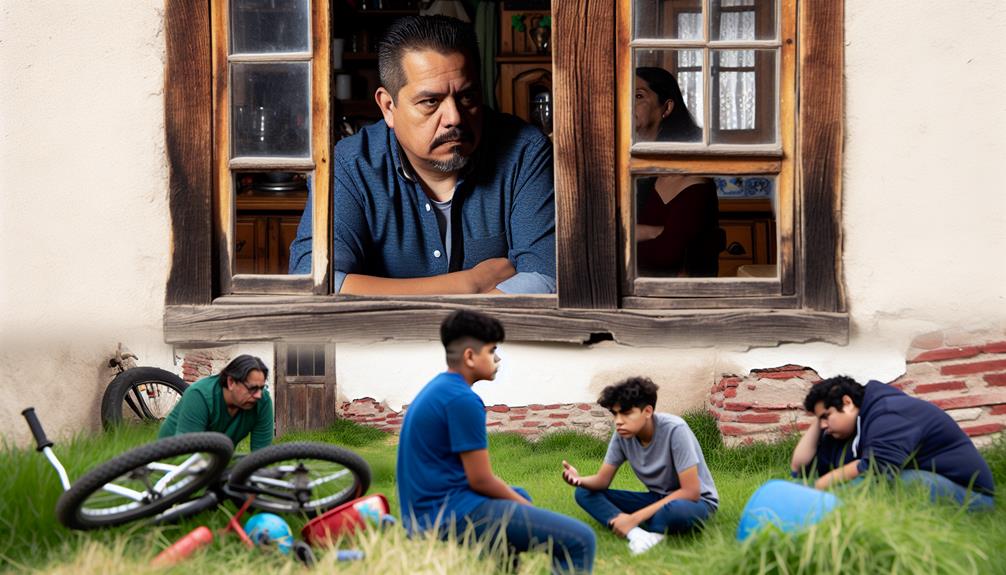To foster your teenager's independence and resilience, stop doing eight key behaviors. First, refrain from completing their homework; instead, guide them to think critically. Avoid making all their decisions; empowering them nurtures self-trust. Limit over-scheduling; allow time for personal exploration and friendships. Don't shield them from failure—experiences shape resilience and emotional intelligence. Cease constant phone monitoring, as it can damage trust. Resist solving every problem; instead, encourage them to find solutions. Give them space to manage friendships independently, and avoid over-explaining life lessons. Embracing these changes can lead to valuable growth opportunities for both you and your teen.
Key Takeaways
- Stop doing homework for your teenager; encourage them to tackle challenges independently to build responsibility and problem-solving skills.
- Avoid making decisions for your teen; allow them to make choices to foster autonomy and critical thinking.
- Refrain from constantly checking their phone; respect their privacy to promote trust and independence in managing their digital lives.
- Don't over-schedule their activities; give them space to explore interests and friendships, nurturing creativity and well-being.
- Stop shielding them from failure; let them experience setbacks to develop resilience and emotional intelligence.
Doing Their Homework

One of the most common pitfalls for parents is the tendency to engage in homework assistance, which can inadvertently undermine a teenager's sense of responsibility and independence. While it may seem helpful, stepping in too often can inhibit their growth in academic responsibility and hinder the development of essential skills. Utilizing tools like Study Island can provide additional support for teens, offering them resources to enhance their understanding and prepare for tests effectively test preparation resources.
Encouraging homework independence allows teens to cultivate self-motivation, which is vital for their overall academic success. By managing their time effectively, they learn how to prioritize tasks and balance various commitments. This process not only fosters responsibility but also enhances critical thinking skills as they navigate complex assignments.
Instead of completing tasks for them, consider guiding your teenager by asking questions that stimulate their thought processes. This approach transforms homework into a valuable learning opportunity, allowing them to tackle challenges on their own. By stepping back, parents enable their teens to embrace the discomfort of struggle, ultimately leading to resilience and confidence in their abilities.
In this nurturing environment, teenagers can thrive, gaining the skills they need for future endeavors while fostering a sense of belonging within their educational community. Supporting their journey towards independence is a gift that will serve them well throughout life.
Making All Their Decisions
Making All Their Decisions
Steering the change from childhood to adolescence involves a critical shift in decision-making, yet many parents find themselves unintentionally making choices for their teenagers. While this instinct comes from a place of love and concern, it can hinder the development of essential decision-making skills. Often, parents may not realize that their own stress and burnout can affect their parenting style, leading to increased control over their teen's choices. Understanding signs of burnout can help parents recognize when it's time to step back and allow their teenagers more freedom to choose understanding burnout.
Allowing teenagers to make their own choices fosters a sense of independence that is crucial for their growth. When parents intervene too frequently, it can send the message that they do not trust their teen's judgment, which may lead to feelings of inadequacy. By stepping back and giving them space to navigate their own decisions, parents support their child's independence development, equipping them with the confidence to face future challenges.
Encouraging open discussions about choices can be an effective way to guide rather than dictate. Ask questions that prompt critical thinking, allowing teens to weigh pros and cons. This approach not only nurtures their decision-making skills but also strengthens the parent-teen relationship, creating a supportive environment where they feel they belong. Remember, the goal is to empower your teenager, helping them to embrace their autonomy while knowing they have your unwavering support.
Over-Scheduling Their Time

Over-scheduling a teenager's time can inadvertently stifle their ability to manage responsibilities and prioritize their own interests. When parents fill every moment of their child's schedule with activities, they may unintentionally undermine the development of essential life skills, such as time management and personal responsibility. Additionally, teaching teens the importance of early saving can help them understand financial stability and independence from a young age.
Teens thrive when given the opportunity to navigate their own schedules, allowing them to explore passions, develop friendships, and learn from both successes and setbacks. By stepping back and allowing your teenager to make choices about how to spend their time, you foster a sense of agency and independence. This not only enhances their confidence but also equips them to handle the pressures of adulthood.
Encouraging your teen to balance commitments with free time nurtures their creativity and well-being. It is vital to engage in open conversations about their interests and aspirations, rather than imposing your own agenda. This collaborative approach fosters belonging, helping them feel understood and supported. By prioritizing their autonomy, you empower your teenager to become a resilient individual who can effectively manage their time and responsibilities, setting them on a path to success in their future endeavors.
Shielding Them From Failure
While allowing teenagers to manage their own schedules is vital for their growth, it is equally important to recognize the role of failure in their development. Shielding them from failure can hinder their ability to cultivate failure resilience, an essential life skill. Just as friends reveal secrets and truths about each other in games like Bad People to foster understanding, embracing natural consequences can lead to invaluable lessons that prepare them for adulthood.
Consider these four key points:
- Encourage Problem-Solving: Allow teens to face challenges and seek their own solutions, fostering independence.
- Support Emotional Growth: Let them experience disappointment; this helps build emotional intelligence and coping mechanisms.
- Promote Realistic Expectations: Help them understand that failure is a part of life, leading to growth and improvement.
- Celebrate Effort, Not Just Outcomes: Acknowledge their hard work regardless of the result, reinforcing the value of perseverance.
Constantly Checking Their Phones

Teens often find themselves glued to their phones, a habit that can become overwhelming for both them and their parents. Constantly checking their phones can infringe on their phone privacy and create unhealthy digital boundaries. As parents, stepping back and allowing your teen the space to manage their own device can promote trust and independence.
| Behavior | Impact on Teen | Suggested Alternative |
|---|---|---|
| Frequent phone checks | Erodes privacy | Discuss digital boundaries |
| Monitoring messages | Increases anxiety | Encourage open dialogue |
| Over-scheduling time | Limits social growth | Allow free time for connection |
| Limiting phone usage | Resentment may build | Establish mutual agreements |
Solving Their Problems
Empowerment is a significant aspect of a teenager's development, yet many parents find themselves instinctively stepping in to solve their problems. While it may seem helpful, this approach can hinder their growth and ability to navigate life's challenges. Instead, consider these strategies for encouraging independence and fostering resilience: Additionally, fostering independence in teenagers is essential as they prepare for their future careers and responsibilities. Understanding how to handle challenges can be beneficial, especially as they explore options like top remote customer service jobs in the coming year.
- Listen Actively: Provide a safe space for your teen to express their thoughts and feelings. This validates their experiences and encourages problem-solving.
- Ask Questions: Guide them to explore solutions by asking open-ended questions. This promotes critical thinking and helps them arrive at their own conclusions.
- Encourage Decision-Making: Allow your teenager to make choices, even if they might lead to mistakes. This empowers them to learn from their experiences.
- Celebrate Efforts: Acknowledge their attempts to solve problems, regardless of the outcome. This reinforces their confidence and persistence.
Managing Their Friendships

Steering friendships is an essential part of adolescent development, and parents often find themselves unsure of how to support their teenagers in this area. While it is natural to want to protect your child from difficult social dynamics, it is vital to step back and allow them to manage their friendships with guidance rather than intervention.
Nurturing independence in your teenager empowers them to navigate relationships, fostering their sense of self and confidence. Encourage them to express their feelings about friendships, and emphasize the importance of healthy communication. By creating a safe space for discussions, you can help them articulate their thoughts and concerns, which fosters communication and strengthens their interpersonal skills.
Instead of directly intervening in their social conflicts, ask open-ended questions that prompt reflection and problem-solving. This approach not only aids in conflict resolution but also equips your teenager with valuable life skills. Ultimately, supporting your teen in managing their friendships allows them to build meaningful connections while feeling secure in their ability to handle social challenges, reinforcing their sense of belonging in a complex world.
Over-Explaining Life Lessons
Steering through the complexities of adolescence can be challenging for both parents and teenagers, especially when it comes to imparting life lessons. While your intentions may be rooted in love, over-explaining can lead to confusion and resistance. Instead of providing excessive guidance, consider the following strategies to foster independence and critical thinking:
- Encourage Self-Reflection: Ask open-ended questions that prompt your teen to think critically about their decisions.
- Share Personal Experiences: Instead of lecturing, share relevant stories that allow your teenager to draw their own conclusions.
- Limit Over-Analyzing Conversations: Recognize when discussions become lengthy and repetitive. Brevity can often enhance understanding.
- Validate Their Feelings: Acknowledge their emotions and experiences to build trust, allowing them to open up without fear of judgment.
Frequently Asked Questions
How Can I Encourage My Teenager to Be More Independent?
Encouraging your teenager to be more independent involves cultivating self-sufficiency skills and fostering resilience. Start by giving them opportunities to make decisions, learn from their mistakes, and tackle age-appropriate responsibilities. Support their interests and encourage problem-solving, while providing guidance as needed. Celebrate their achievements, reinforcing a sense of belonging and capability. By nurturing their independence, you empower them to navigate challenges, ultimately fostering a strong foundation for their future growth and self-confidence.
What Are the Signs My Teen Is Overly Reliant on Me?
Signs that your teenager may be overly reliant on you include an evident emotional dependence, where they consistently seek your approval or reassurance for everyday decisions. Additionally, if they struggle with basic decision-making skills and often defer to you for guidance on minor issues, it may indicate a lack of confidence. Observing these behaviors can help you identify areas where fostering independence and self-reliance is essential for their healthy development and sense of belonging.
How Do I Balance Support and Independence for My Teenager?
Balancing support and independence for your teenager involves effective boundary setting and trust building. Begin by openly communicating your expectations while allowing them to express their thoughts and feelings. Encourage them to make decisions and face consequences, fostering resilience. Celebrate their achievements to reinforce confidence, while remaining a supportive presence. This approach not only cultivates their independence but also strengthens your relationship, creating a nurturing environment where they feel valued and understood.
When Should I Start Stepping Back From Parenting Duties?
Determining when to step back from parenting duties involves recognizing key autonomy milestones in your teenager's development. As they approach young adulthood, gradually allowing them more independence fosters confidence and self-reliance. This parenting shift should be tailored to your teen's readiness, ensuring they feel supported yet empowered. Engage in open dialogues about responsibilities and expectations, facilitating a collaborative approach that nurtures their growth while reinforcing your enduring presence in their lives.
How Can I Communicate Effectively With My Teenager About Responsibilities?
Effective communication about responsibilities with your teenager hinges on establishing active listening and open dialogue. Create a safe space where they feel comfortable expressing their thoughts and concerns. Approach discussions with empathy, validating their feelings while gently guiding them towards understanding their responsibilities. Encourage them to share their perspectives, fostering a sense of belonging and collaboration. This supportive environment not only strengthens your relationship but also empowers them to take ownership of their duties.



